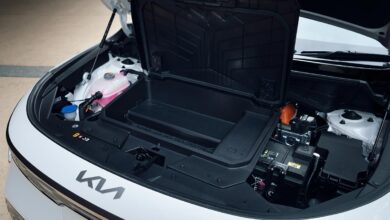On-Road Diesel Myths Debunked

Diesel engines are used in a wide variety of applications, including commercial trucking and public transportation.
Despite their prevalence, misconceptions about diesel fuel and its use persist, clouding knowledge of its efficiency, environmental impact, and operational characteristics.
The objective is to debunk common myths surrounding on-road diesel, shedding light on its significance and advantages in transportation. Addressing these misconceptions will emphasize the crucial role of on-road diesel in contemporary logistics. The discussion centers on clarifying its impact and efficiency within the transportation sector. And finally, the intent is to foster a clearer understanding of on-road diesel’s contributions.
Myth 1: Diesel Engines Are Environmentally Unfriendly
Diesel engines have historically been associated with higher pollutant emissions, particularly particulate matter and nitrogen oxides. These concerns have led to the belief that diesel is more harmful to the environment than gasoline. However, this viewpoint is becoming increasingly outdated. The implementation of stringent emission regulations, particularly in Europe and the United States, has accelerated advances in diesel technology.
Modern diesel engines come with sophisticated emissions control systems, such as Diesel Particulate Filters (DPF), Selective Catalytic Reduction (SCR), and Exhaust Gas Recirculation (EGR). According to a World Health Organization report, modern diesel engines emit fewer pollutants per mile than older models, effectively mitigating previous environmental concerns. It is critical to recognize that, when compared to gasoline engines, diesel engines have a lower carbon footprint due to increased efficiency and lower CO2 emissions per kilometer traveled.
Myth 2: Diesel Fuel Is More Expensive than Gasoline
A common misconception is that diesel fuel is consistently more expensive than gasoline, implying that diesel vehicles are inherently more expensive to operate. While the price of diesel and gasoline can fluctuate depending on market conditions, historical data shows that diesel engines frequently provide better fuel efficiency—up to 30-40% more than gasoline engines.
This increased efficiency translates into longer distances covered per gallon of fuel, making diesel vehicles an economically viable choice. The US Department of Energy reports that the total cost of ownership for diesel vehicles in a variety of applications, including heavy-duty trucking, has decreased. As a result, while diesel fuel prices can be slightly higher at times, the overall cost savings from fuel economy should not be overlooked.
Myth 3: Diesel Engines Require Excessive Maintenance
Discussions about diesel engines frequently include concerns about maintenance costs and complexity. Many people believe that because of their complex fuel systems and operating characteristics, diesel engines require more frequent and intensive maintenance than gasoline engines. While diesel engines do necessitate some special maintenance considerations, particularly regarding the fuel system and emissions controls, the notion that they require excessive upkeep is false.
In fact, diesel engines are built to last and outlast their gasoline counterparts. With proper maintenance, diesel engines can maintain peak performance for hundreds of thousands of kilometers. Diesel engines’ dependability, combined with their strong construction, frequently results in lower overall repair costs over the vehicle’s lifetime, challenging the perception of high maintenance requirements.
Myth 4: Diesel Engines Are Loud and Uncomfortable
Another common misconception is that diesel engines are excessively loud and rough-running. While older diesel models were noisier than gasoline engines, technological advancements have significantly reduced this problem. Modern diesel engines use advanced sound-damping measures and refined fuel injection systems to significantly reduce operational noise.
Moreover, modern diesel vehicles are subject to stringent design standards that prioritize passenger comfort and overall driving experience. Comprehensive research shows that modern diesel vehicles can operate at noise levels comparable to gasoline-powered vehicles, resulting in a more pleasant and refined driving experience.
Myth 5: Diesel Fuel Contributes Negatively to Engine Longevity
Another myth perpetuated by misinformation is that only gasoline engines have the potential for extended longevity and dependability. Diesel engines, on the other hand, benefit from high thermal efficiency and lower RPM operation, which contribute to less wear and tear. Diesel engines are frequently designed with heavier-duty components to withstand the higher compression ratios associated with diesel combustion.
According to research conducted by various automotive experts, diesel engines have longer lifespans than gasoline engines, especially in heavy-duty applications. Diesel engines’ longevity is demonstrated by their widespread use in commercial fleets and heavy-duty vehicles that routinely travel hundreds of thousands of miles.
Key Takeaways
On-road diesel myths stem from misunderstandings that ignore technological advancements and regulatory changes that have transformed diesel technology. Recognizing the truth about diesel engines is critical as society seeks more efficient and environmentally responsible transportation solutions. A well-informed public can better understand diesel fuel’s role in sustainable transportation, allowing for more informed decisions that benefit both the economy and the environment.
Furthermore, ongoing advancements in diesel technology, combined with a commitment to reducing emissions, highlight the importance of changing public perceptions. Modern diesel engines are now a viable and responsible component of our transportation future, thanks to improved technologies and stringent emissions standards. By debunking these myths, it becomes clear that diesel fuel deserves a more balanced discussion in light of today’s energy and environmental challenges.
Keep an eye for more latest news & updates on USA Tech Magazine!





